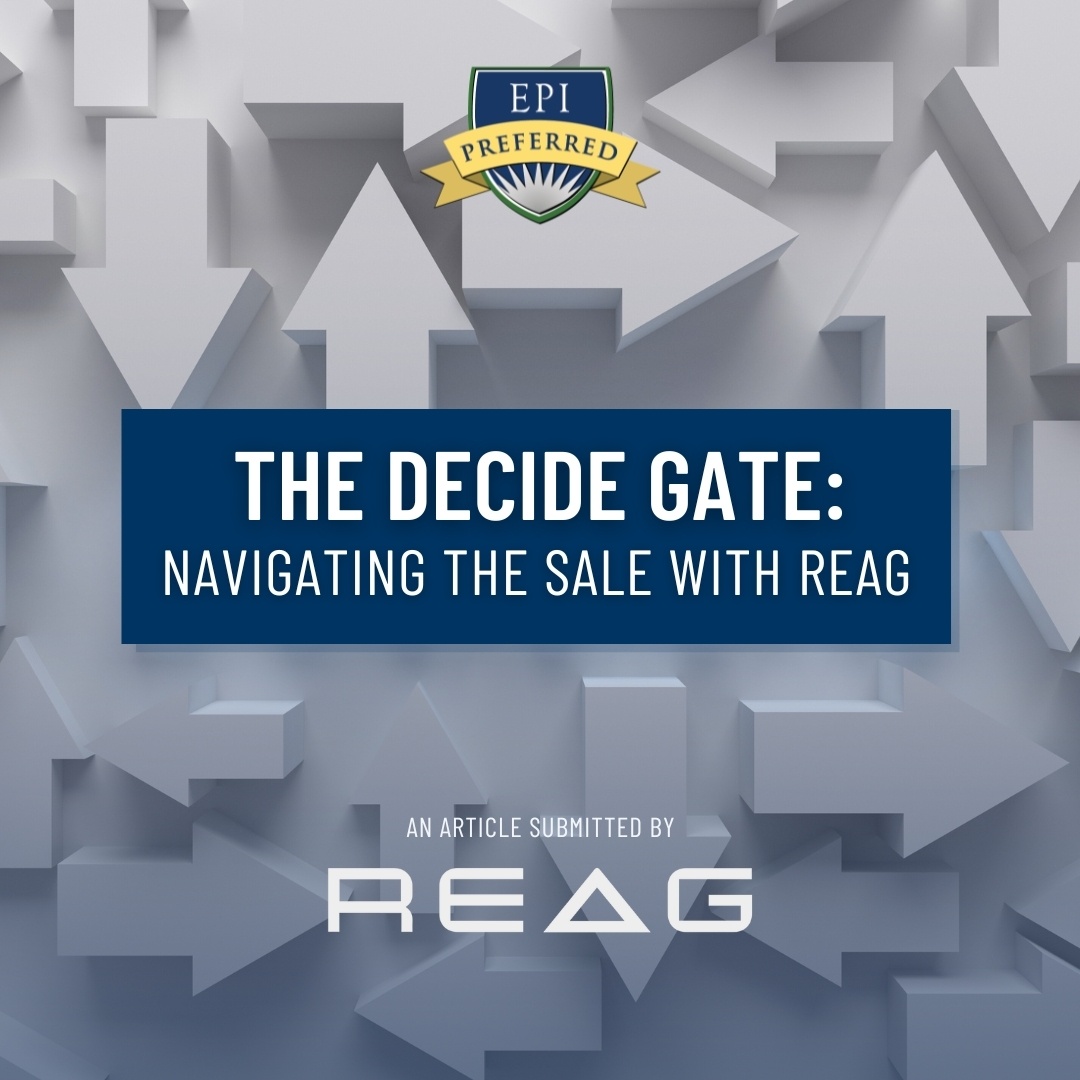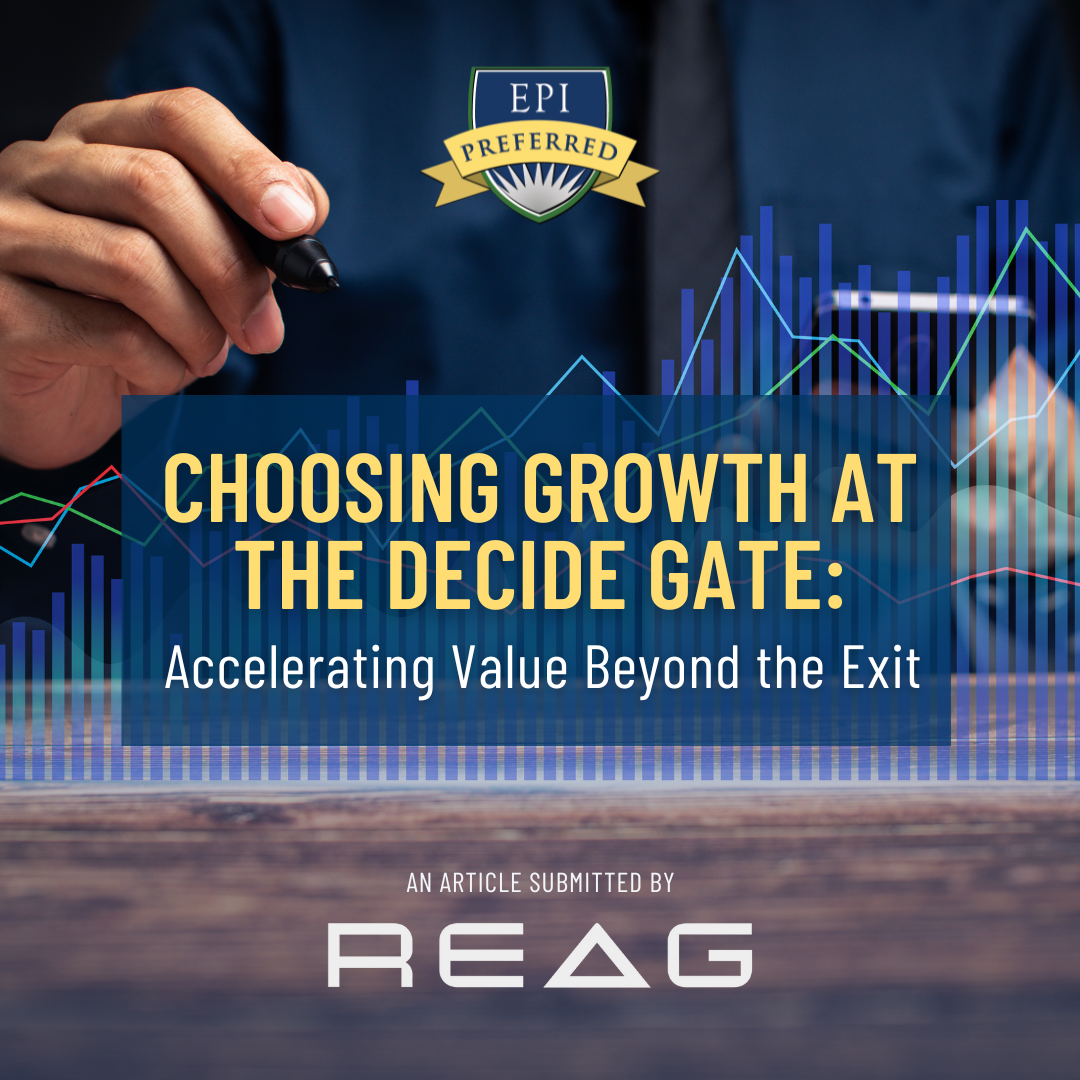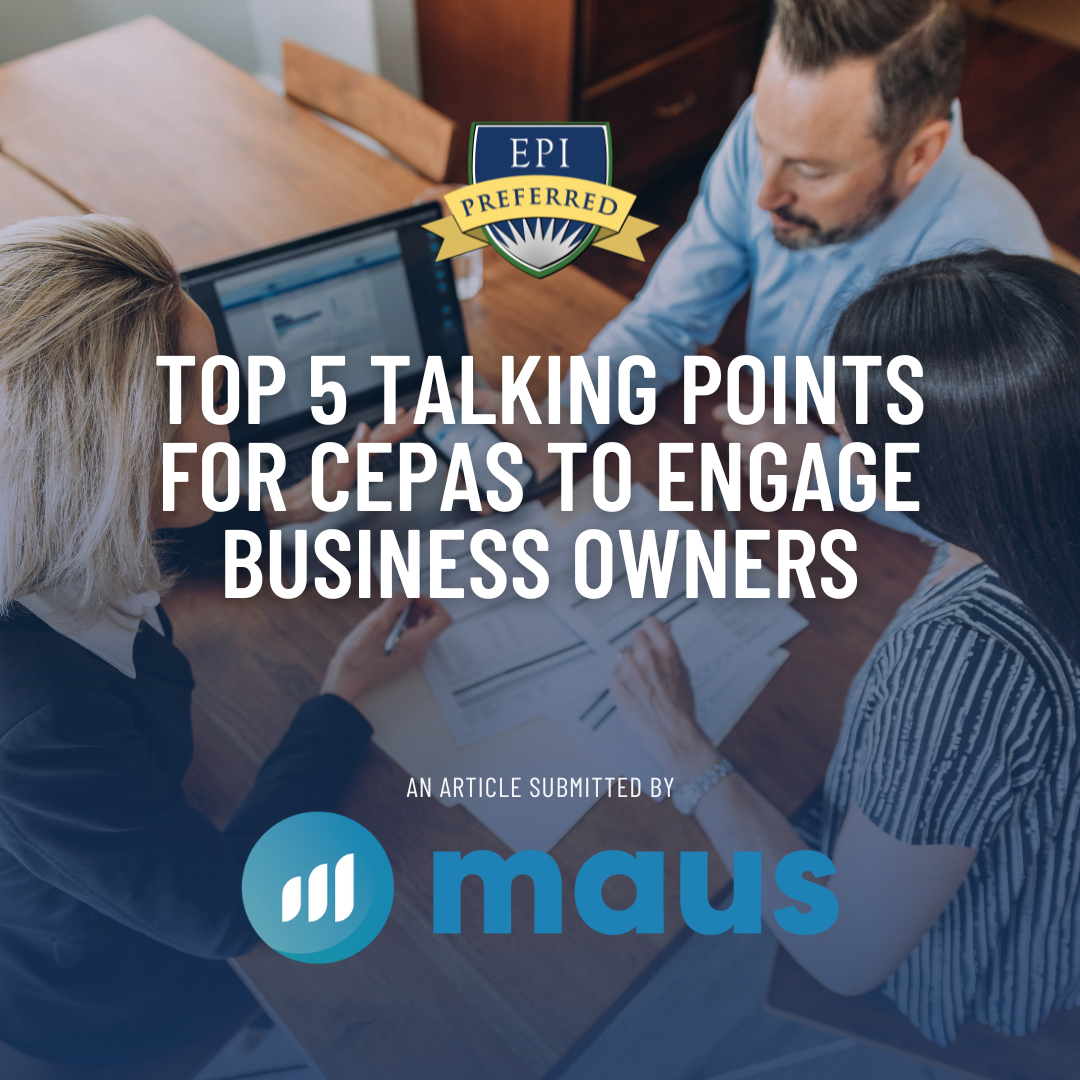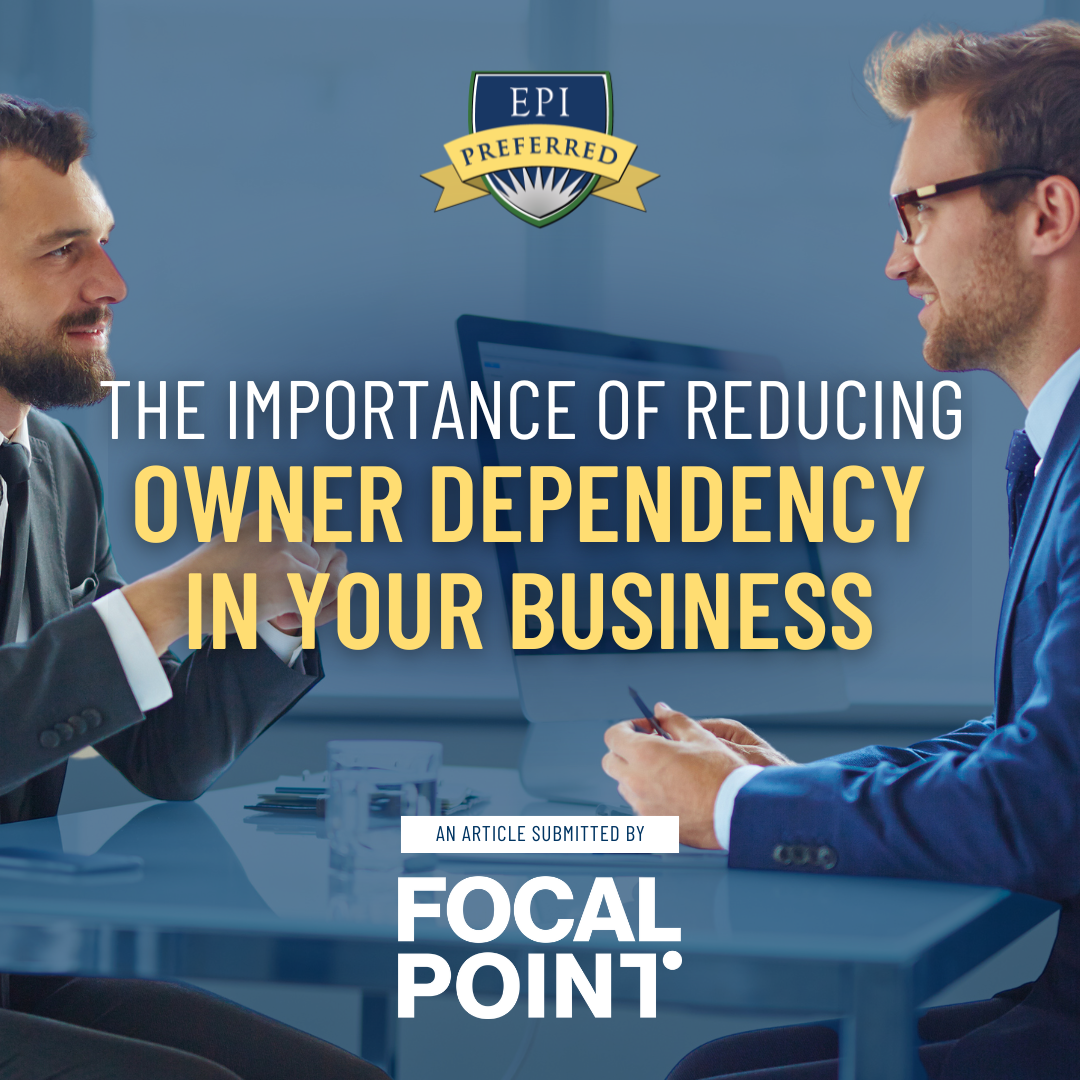
THE EXIT PLANNING BLOG
Keep up-to-date with exit planning, succession planning, industry trends, unique specialty insights, and useful content for professional advisors and business owners.
Share this
The Decide Gate: Navigating the Sale with REAG
by Partner Contributed Article on September 3, 2024

The Decide Gate: Choosing to Sell Your Business
The Decide Gate represents the culmination of the Value Acceleration Methodology, where Certified Exit Planning Advisors’ (CEPAs) clients make the final decision to move forward with their exit plan, grow or in some cases maintain the status quo. For business owners, navigating the intricacies of this process can be emotionally taxing but ultimately rewarding when executed thoughtfully.
In our previous posts, we explored how REAG supports CEPAs and their clients through the Pre-Discover and Discover, and the Prepare Gates of the Value Acceleration Methodology.
REAG's Role in the Decide Gate
Here we will focus on your business owner and founder clients that have decided to sell their companies.
With a clear understanding of their business value and readiness, at the Decide Gate, your clients are empowered to make strategic decisions that align with their personal and financial goals.
When an owner decides to sell, they move into the Decide Gate, initiating the transition process. This phase includes evaluating specific exit options, preparing the business for sale, and ensuring all personal and financial plans are in place. REAG’s team of experienced advisors works closely with you and your clients to refine their exit strategies and maximize the value of their companies during this crucial period.
Choosing to sell a business is a significant decision that requires careful consideration and expert guidance. As experts in private capital market dynamics with a proven sell-side process,
REAG provides the insights and support needed to navigate this critical juncture and execute a successful confidential exit strategy.
Structured Approach to Transitioning Ownership
REAG's structured approach to business exits provides comprehensive support for owners entering the Decide Gate phase who choose to confidentially sell their business. The owner’s CEPAs offer flexible options and strategic choices, helping them evaluate exit strategies based on personal goals, market conditions, and business readiness. REAG works closely with CEPAs and their clients to assess the feasibility of exit plans, identify potential obstacles, and make necessary adjustments, empowering them with data-driven insights and market analysis for effective decision-making.
Understanding the M&A Buyer Landscape
There are three main types of buyers in the mergers and acquisitions (M&A) market for lower middle market transactions: strategic, financial, and individual.
Understanding the motivations and characteristics of these three buyer types is crucial for sellers to maximize their company's value and ensure a smooth transition during the M&A process. By tailoring their approach to the specific buyer type, REAG can significantly increase the seller’s chances of a successful transaction.
.png?width=4725&height=3150&name=BUYER%20HIERARCHY%20(1).png)
Strategic Buyers: Industry Insiders
Strategic buyers are typically companies seeking to acquire businesses within their industry or adjacent sectors to strengthen their market position, create economies of scale, and achieve objectives such as increasing market share, diversifying products, accessing new technologies, and expanding their talent pool. While they often pay the highest multiples and bring valuable industry knowledge, strategic buyers may alter the acquired company's direction, potentially compromising its independence. To appeal to these buyers, sellers should emphasize long-term value, showcase their company's strengths in areas like market share and technology, and demonstrate potential synergies and cost savings opportunities.
Financial Buyers: Return-Driven Investors
Financial buyers, typically private equity firms or family offices, differ from strategic buyers in that they primarily seek profitable returns on investment rather than industry synergies. These buyers focus on well-maintained companies with growth potential, often using capital to expand the business over 3-7 years and potentially acquiring add-on companies to increase scale. Financial buyers are generally more flexible in deal structure and may consider various investment forms beyond full acquisition, such as management buyouts, rollover equity or providing growth capital, aiming for a smooth transition and business professionalization post-investment.
Individual Buyers: The Entrepreneur's Path
Individual buyers are typically high-net-worth individuals seeking a single business acquisition as an opportunity for independence, wealth-building, or legacy creation. While they may preserve a company's unique vision, they might lack the resources for significant growth post-acquisition. To appeal to these buyers, it's crucial to align the opportunity with their interests and experience, emphasizing both positive and negative aspects of the company within the context of their passion for the product, service, or industry.
REAG's Comprehensive Sell-Side Process: Creating a Confidential Competitive Market to Maximize Value for Your Clients
Kickoff: Gathering Essential Information
The process begins with a comprehensive gathering of company information, including financials, operations, and marketing data. This phase also involves analyzing the supply chain, competitors, and identifying potential acquirers.
Research and Outreach: Presenting the Opportunity
REAG develops offering materials and presents the opportunity to potential acquirers. A timeline is established for the review process, including milestones for submitting interest, management meetings, LOI negotiations, and due diligence coordination.
Initial Engagement: NDAs and Preliminary Discussions
After executing nondisclosure agreements, REAG provides access to a Confidential Information Memorandum (CIM) and a secure virtual data room to facilitate the flow of information during preliminary Q&A. This phase culminates in coordinating introductions and collecting indications of interest from potential acquirers.
Site Visit: Facilitating Management Meetings
REAG facilitates a management meeting, allowing potential acquirers to gain deeper insights into the company's operations and meet key personnel.
Negotiations: Analyzing and Securing LOIs
REAG gathers, reviews, analyzes, and negotiates Letters of Intent (LOIs) with potential acquirers to achieve our client’s objectives as determined during the exit planning process.
Due Diligence: Managing and Coordinating the Flow of Information
REAG coordinates and facilitates the due diligence process with the chosen acquirer. They also introduce appropriate debt and equity sources as required and collaborate with all deal team advisors to reach closing.
Your Partner in Executing a Successful Exit
The Decide Gate is where business owners make critical decisions about their exit. Having a clear strategy and support from experienced advisors like REAG ensures informed decision-making throughout the process.
Our expertise spans astute sell-side guidance across various exit pathways, including Third-Party Sales, LBOs, MBOs, and recapitalizations. Leveraging robust relationships with private equity, family offices, and strategic buyers, along with a refined process, we ensure optimal outcomes for your client’s exit.
Remember: selling your business is a process – not an event. If you're ready to unlock the unrealized value of your company and execute a successful exit strategy, reach out to REAG, and let's begin this journey together.
Related Resources:
Share this
- Blog (548)
- CEPA (431)
- exit planning (249)
- CEPA community (188)
- Business Owner (175)
- Exit Planning Summit (99)
- EPI Chapter Network (89)
- Value Acceleration Methodology (81)
- Exit Planning Partner Network (76)
- EPI Announcement (50)
- Content (48)
- Webinars (37)
- Excellence in Exit Planning Awards (34)
- Marketing (30)
- 2024 Exit Planning Summit (28)
- 5 Stages of Value Maturity (26)
- Books (24)
- EPI Academy (24)
- EPI Team (22)
- Exit Planning Teams (22)
- Leadership (21)
- 2023 Exit Planning Summit (20)
- family business (20)
- women in business (19)
- Intangible Capital (18)
- Exit Options (17)
- Black Friday (16)
- CPA (15)
- Walking to Destiny (15)
- Chapters (14)
- State of Owner Readiness (14)
- charitable intent (13)
- Chris Snider (12)
- National Accounts (12)
- Small business (12)
- personal planning (12)
- Financial Advisors (11)
- Season of Deals (9)
- 5 Ds (8)
- About us (8)
- Podcast (8)
- Scott Snider (8)
- Insiders Bash (7)
- Christmas (6)
- Exit Planning Content Library (6)
- Case Studies (5)
- Owner Roundtables (5)
- Three Legs of the Stool (5)
- Value Advisors (5)
- financial planning (5)
- Awards (4)
- Circle of Excellence (4)
- EPI Thought Leadership Council (4)
- Exit & Succession (4)
- Five Ds (4)
- executive training (4)
- DriveValue (3)
- Owners Forum (3)
- author (3)
- forbes (3)
- Exit Is Now Podcast (2)
- Peter Christman (2)
- Veteran (2)
- Whitepapers (2)
- Annual Exit (1)
- Business Owners Forum (1)
- SOOR (1)
- business consultants (1)






